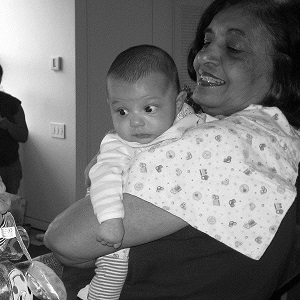Baby boomers are not selfish – policymakers should help them give more
Hogging houses. Avoiding the chancellor’s axe. Beneficiaries of generous pensions and healthcare from government. This is the stereotype of a babyboomer, today’s 50 and 60-somethings who have become the new bankers: lambasted for their apparent selfishness. The babyboomers have indeed been...
Hogging houses. Avoiding the chancellor’s axe. Beneficiaries of generous pensions and healthcare from government. This is the stereotype of a babyboomer, today’s 50 and 60-somethings who have become the new bankers: lambasted for their apparent selfishness.
The babyboomers have indeed been a lucky generation. Between 1995 and 2005, the average net financial wealth including housing of those aged 55-64 tripled, whereas it reduced by two thirds for those aged 25-34. As this large cohort transits to retirement, many will enjoy generous pensions and consume a greater proportion of public resources, especially on healthcare in later life.
But it is quite wrong to assume that babyboomers just take from society; they are actually great givers. There is some evidence to suggest that they are giving more support – both financially and practically – to their children and increasingly their elderly parents than in the past.
A majority of all couples with young children have received some form of financial support from their parents. Likewise, the Family and Childcare Trust found that 35 per cent of young families rely on grandparents for childcare, estimated to be worth in aggregate anything between £4bn to £50bn. A large number of baby boomers are what researchers label the ‘sandwich generation’, with caring responsibilities both upwards and downwards.
The babyboomer cohort are also set to contribute an increasing amount to the economy in future years, especially because of the phasing out of the default retirement age and rising state pension age. The majority of over-50s say they want to continue working beyond state pension age and gradual retirement – where people reduce their hours but continue being employed – is becoming more common. Grandparents in England are already more likely to be in paid work compared to those in other European countries.
This state of affairs – with older people providing more care and working longer – alters the traditional life-cycle model of the family: where those in middle-age are net contributors and those at either end of life are net consumers. As Professor Emily Grundy has noted: “In Britain, the balance of intergeneration exchanges is downward rather than upward, in contravention of depiction of older adults as ‘burdens’ on younger generations.”
So this common conception of affluent babyboomers extracting resources away from younger generations is simplistic and in fact detracts from more pressing public policy problems. First, it masks the more significant socio-economic differences that exist within generations, with inequality more pronounced among older generations due to the maturing of assets and potential for higher earnings.
Second, and most importantly, it distracts from the inequalities that emerge as a result of these generous intergenerational transfers. Affluent babyboomers are able to and indeed do transfer more resources to their children; recent analysis by the Social Market Foundation of the British Household Panel Survey signifies that people with equivalised household incomes of £30,000 or more are three times more likely to donate money regularly to their adult children than those on equivalised household incomes of £10,000 or less. Educational and employment opportunities, as well as home ownership, are becoming more determined by family background.
Analysis of time use surveys, which have tracked the diaries of 66,000 people for nearly half a century, suggest that people spend more time both working and looking after their children, squeezing the time for recreation and community activities. Evidence suggests that trust and social capital in the UK, therefore, have eroded, meaning support from families rather than friends and neighbours – even the state, in some cases – has become more important. As the Executive Chair of the Resolution Foundation, David Willetts has argued, “The future is tall, thin families in a wide, flat world. This is why the family is becoming so important for delivering the intergenerational contract”.
The deepening importance of family wealth to how we do in life is increasing inequality of outcomes. This will mostly offend those on the left of political spectrum, but it also undermines the principle of reward being linked to effort, which frustrates those on the right of the political spectrum.
The approach to this challenge should not be to penalise a natural and admirable motivation: to pass on resources to your children to help them out. Of all types of taxes, for example, the public believes inheritance tax is the most unfair. Instead, policymakers should seek to devise policies that will make it easier for those babyboomers on more modest incomes to support their wider family, practically and financially.
So, for instance, we know that the employment rate of over 50s is rising and will continue to do so. Being a working grandparent will become more common. It will be important to ensure they have flexible working arrangements to juggle their work and family commitments. The new shared parental leave and transferable tax allowance that have been recently introduced should be extended to the babyboomers. A young couple with children should be able to transfer any of 50 weeks paid shared parental leave to one of their own parents.
And, if a grandparent leaves the labour market to look after their grandchildren, a certain proportion of their personal tax allowance should be transferable to their children if they are a basic rate taxpayer.
Those on modest incomes ought to be encouraged to save through the introduction of new tax-free, high interest contributory top-up accounts, paid into through a new optional class of national insurance contributions. Government should top up these accounts for those on the lowest incomes to encourage further saving. These accounts could then be drawn down from when the individual faces tougher times – being on universal credit or during parental leave. But, if they get to retirement and still have a surplus in their account, they should be able to access the funds, or transfer them to their wider family.
These are just small steps advocated by Bright Blue to strengthen the role of familial support from baby boomers on modest incomes. Actually, they are doing quite a lot already: for instance, over 1 in 5 families on equivalised annual incomes between £10,000 and £14,999 per annum give regular financial support to their adult children. Likewise, research shows that 18 per cent of those on low incomes regularly prepare cooked meals for their adult children, 16 per cent regularly give lifts in a car to their adult children, and 16 per cent regularly do the decorating, gardening or housing repairs for them. The key is to develop a flexible labour market and savings culture that allows babyboomers to enhance the support many want to provide.
The babyboomers, excited about slowly settling into retirement and enjoying time with their grandchildren, now have the opportunity to transform their image of being a lucky generation to a giving one. Policymakers can help more of them to do it.

